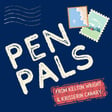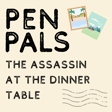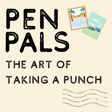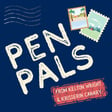
Literary Pathways: AWP Bonus Episode
In this special bonus episode, Krisserin takes you on a journey through the 2025 AWP Conference in Los Angeles, where she sought out the voices on the edges of the literary world rather than the mainstream publishing houses. From self-published epic fantasy writer Omari Richards to the undergraduate editors of Rock and Sling, from Chelsea Hodson's innovative Rose Books to Chiwan Choi's bold assertion that "in 2025, we no longer need permission to publish our work," these conversations reveal the many paths to getting your words into the world. Join Krisserin as she discovers that beyond the intimidating crowd of 12,000 writers lies a vibrant ecosystem of indie presses, writing communities, and alternative MFA programs that are redefining what it means to be published in today's literary landscape.
Featured Interviews:
Omari Richards, Author of "The Kimoni Legacy Book One: Initiation"
Website: omari-richards.com
Instagram: @omari_a_richards
Rock and Sling Literary Journal (Whitworth University)
Website: rockandsling.com
Instagram: @rock.and.sling
Zachary Jensen
Website: angelcityreview.com
Instagram: @angelcityreview
Harrison Gale, Creative and Business Director of The Book Incubator
Website: thebookincubator.com
Instagram: @book.incubator
Avitus B. Carle, Author of "These Worn Bodies"
Website: avitusbcarle.com
Instagram: @avitusbcarle
Victoria Bustamonte
MFA Program Coordinator for the Creative Writing Department at the Institute of American Indian Arts (IAIA)
Website: iaia.edu
Chiwan Choi, Author of "Sky Songs"
Writ Large Projects (formerly Writ Large Press)
Website: writlargeprojects.org
Instagram: @chiwan
Flo, Programming for Wendy's Subway
Website: wendyssubway.com
Instagram: @wendyssubway
Chelsea Hodson, Publisher of Rose Books. Author and creator of Morning Writing Club
Rose Books: rosebooks.co
Morning Writing Club: morningwritingclub.com
Instagram: @chelseahodson_
Amy Brill, Author of "The Movement of Stars"
Website: amybrill.com
Instagram: @amybrillbk
Thank you for listening to this special bonus episode! If you enjoyed these conversations about alternative paths to publishing, please subscribe to our podcast and share with other writers in your community.



